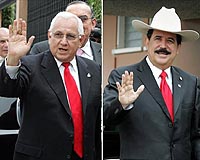| . |  |
. |
San Jose (AFP) July 19, 2009 Officials representing ousted President Manuel Zelaya of Honduras said Sunday mediated talks with the country's de facto government had collapsed. The end of the talks in the Costa Rican capital came after the delegation for the de facto government rejected a mediated plan calling for Zelaya's return. The head of Zelaya's delegation in San Jose, Rixi Moncada, announced the end of the discussions hosted by Costa Rican President Oscar Arias, a Nobel Peace Prize laureate. Arias responded by pleading for three more days to resume negotiations. "We announce that this dialogue with the commission from the de facto regime... is finished," Moncada said. Just before, her counterpart from the de facto government's delegation, Carlos Lopez, said Arias's proposal for Zelaya's return as president was "unacceptable" and constituted interference in Honduras's affairs. Arias, who had been pushing a plan for Zelaya to return at the head of a unity "reconciliation" government ahead of early elections, called for 72 hours more for the negotiations.
earlier related report Costa Rican President Oscar Arias, who is mediating talks here aimed at resolving the three-week-old Honduran crisis, told reporters that the negotiations, which got underway Saturday, would resume Sunday at 11:00 am (1700 GMT). The Costa Rican leader proposed Saturday during a marathon session that Zelaya -- tossed out by his own troops in a coup -- return to the country under the terms of a national reconciliation plan. Arias urged a delay of the move at least until next Friday, which a spokeswoman for Zelaya said the ousted leader would accept. Arias, a Nobel Peace Prize winner, made the suggestion to representatives of Zelaya and de facto Honduran president Roberto Micheletti, whose interim government is under intense international pressure to resolve the crisis prompted by the first Central American coup since the Cold War. No agreement was reached Saturday on the pivotal issue of whether Zelaya would return to the presidency, but Arias said the two sides would meet again Sunday after attending mass. The seven-point proposal envisions Zelaya's return to power at the head of a government of "unity and national reconciliation," and the declaration of a general amnesty absolving those who participated in and opposed his June 28 ouster. The Arias proposal would also see presidential elections moved up to November, with control of the army transferred to the Supreme Electoral Tribunal one month before so military forces could "guarantee a transparent and smooth voting process." But Micheletti has repeatedly expressed his strong opposition to Zelaya's return or the possibility of the deposed leader serving out the remainder of his term until January 27, 2010. And his deputy foreign minister, Martha Lorena Alvarado, reiterated in Tegucigalpa Saturday that the return of the ousted president would be "very difficult." However, the top Micheletti envoy in Costa Rica, Carlos Lopez, promised to "thoroughly examine" the Arias plan. Arias's proposal would also require Zelaya to "expressly renounce" plans to hold consultative votes seeking to gain support for constitutional changes to terms limits. His attempts to shore up support for changes to the constitution was the precipitating factor in his arrest and expulsion from Honduras by the country's military last month. The Costa Rican leader acknowledged that "many differences" continued to keep the sides apart and that the parties will have to show "flexibility to bring themselves closer" to agreement. A diplomatic source told AFP the delegations continue to differ on the issue of Zelaya's return. US officials have already warned that any attempt by Zelaya to return could jeopardize negotiations between his and Micheletti's representatives. "Tensions are very high," US State Department spokesman Robert Wood said in Washington. Zelaya tried two weeks ago to enter Honduras on a Venezuelan jet but was prevented from landing at the main airport by Honduran military vehicles parked on the runway. Zelaya's strongest ally, Venezuelan President Hugo Chavez, said the ousted head of state will be restored to power. "Zelaya is going to enter Honduras, let's see what those thugs do," Chavez said, referring to the Micheletti government. Rumors had swirled at the beginning of the weekend that Zelaya might try to cross into Honduras by land from Nicaragua, possibly with Venezuelan or Nicaraguan military units. But Rixi Moncada, a spokeswoman for Zelaya, said the deposed president had accepted Arias's plea for a delay. "We have accepted Friday, July 24 as the day when Zelaya should return to the republic," Moncada said. Meanwhile, a grenade hurled overnight Saturday in Tegucigalpa, caused light damage to a building in the south of the capital city. Earlier in the day, hundreds of protestors blocked roads around the capital, while altercations between opposing groups left several protestors with minor injuries. Share This Article With Planet Earth
Related Links Democracy in the 21st century at TerraDaily.com
 Interim Honduran leader sets curfew, conditions for exit
Interim Honduran leader sets curfew, conditions for exitTegucigalpa (AFP) July 15, 2009 Interim Honduran leader Roberto Micheletti reimposed a late-night curfew beginning Thursday in a bid to curb disturbances from supporters of ousted president Manuel Zelaya. The reinstatement of the curfew, which became effective between midnight and 5:00 am (0600 and 1100 GMT), came after Micheletti said he would be prepared to step down, but only if Zelaya does not return to power. ... read more |
|
| The content herein, unless otherwise known to be public domain, are Copyright 1995-2009 - SpaceDaily. AFP and UPI Wire Stories are copyright Agence France-Presse and United Press International. ESA Portal Reports are copyright European Space Agency. All NASA sourced material is public domain. Additional copyrights may apply in whole or part to other bona fide parties. Advertising does not imply endorsement,agreement or approval of any opinions, statements or information provided by SpaceDaily on any Web page published or hosted by SpaceDaily. Privacy Statement |